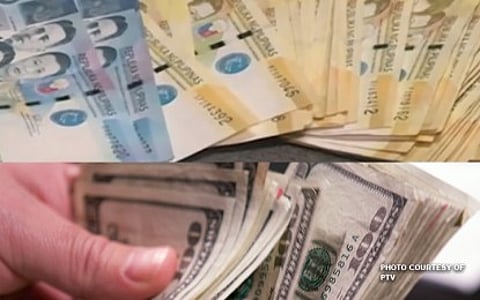
- NEWS
- the EDIT
- COMMENTARY
- BUSINESS
- LIFE
- SHOW
- ACTION
- GLOBAL GOALS
- SNAPS
- DYARYO TIRADA
- MORE

The Bank of the Philippine Islands (BPI) said the peso could weaken to P60.4 per US dollar if Trump’s high tariffs against Canada, China and Mexico lead to a massive trade war.
“We’re looking at 60 just because Trump is very unpredictable,” BPI chief economist Jun Neri said Wednesday in a virtual media briefing. This is higher than his 57.845 estimate for the year 2024.
Neri said the foreign exchange forecast reflects the indirect effects of Trump’s tariffs on the interest rates of Philippine banks. The reason, Neri said, is that the country does not heavily export goods to the US, unlike the three aforementioned countries.
The BPI economist said the Bangko Sentral ng Pilipinas (BSP) might reduce its 5.75 percent policy rate for lenders more slowly, mirroring the approach of the US Federal Reserve.
BPI strategist Marco Javier shared that Federal Reserve chairman Jerome Powell said officials are “not in a hurry” to cut the policy rate in order to prevent US inflation from spiking.
“Consumer confidence in the US dropped to a four-year low, and the University of Michigan data shows inflation over one year can approach 5 percent in the next five to 10 years,” Javier said.
The US Labor Department reported inflation grew by 0.2 percent last month, marking a 2.8 percent growth in 12 months. The Federal Reserve targets to lower inflation to 2 percent, similar to the goal of the Philippines’ central bank or the BSP.
Neri said BPI will be monitoring global economic data that will surface once US President Donald Trump realizes his over 10 percent tariffs on Canada, Mexico and China on 2 April.
Assuming stable global economic conditions, Neri said the BSP might ease its policy rate twice this year in April and before the last quarter from 5.75 percent to 5.25 percent.
He said the BSP might pause the rate reduction to control possible higher inflation due to rice prices.
However, Neri said the BSP might limit its rate reduction to 4.75 percent next year to discourage banks from incurring poor-quality loans or assets.
“If growth becomes too slow, then maybe they can cut some more. But 4 percent or 3 percent can subject the economy to the dangers of resource misallocation and worsening inequality,” the BPI economist said.
With lower BSP rates, Javier added household consumption could increase to 5 percent this year from 4.7 percent last year, expanding the overall economy by 6.3 percent from 5.6 percent.
